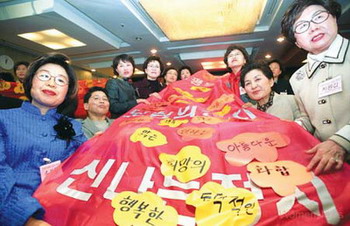The Uri Party proposes a ''duo-seat system''... Woman groups insist on 30%-odd female proportional representation in upper-level local governments

The Democratic Labor Party(DLP) intends to increase female candidates by expanding the ratio of proportional representation seats to 1:1 through revamping laws, while going ahead with a compulsory quota of 30% for female candidates in local districts by way of institutional reforms within the party. The DLP has already set up a planning division for 2006 local elections in its committee on women's affairs. The new division has been discussing the party's institutional reforms, and is carrying out projects including training to single out candidates, and supportive projects to stimulate female participation in politics.
In woman circles, Cho Hyun Ock, President of the Korea Women's Political Solidarity
(KWPS) proposed a ‘duo-seat system’ or a female upper-level electoral district system for lower-level local councils. KWPS also demanded an increase of the ratio of proportional representation seats at least up to 30% for upper-level local councils, nomination of more than 30% of women as local district candidates, a raise in the government subsidy, and complement of local primaries. Currently, women account for 9.2% of the total representatives in upper-level local councils, and 2.2% of the total in lower-level local councils.

